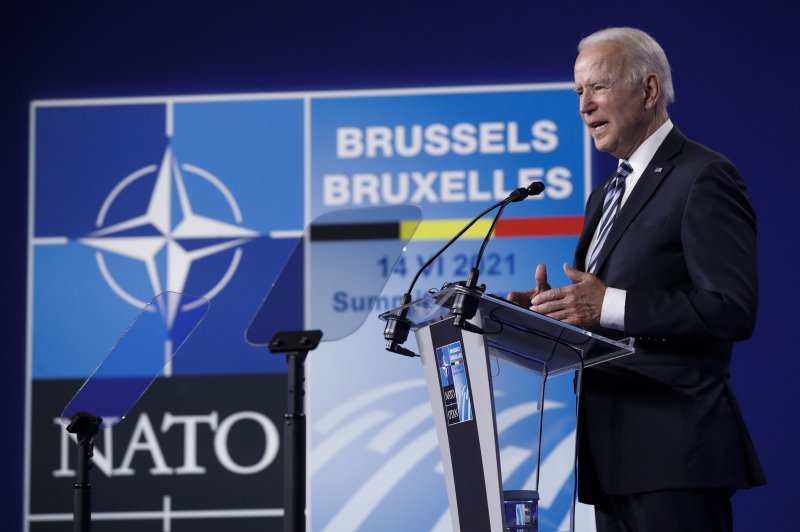1 of 6 | President Joe Biden holds a press conference following the NATO summit in Brussels, Belgium, on Monday. Pool Photo by Olivier Hoslet/EPA-EFE
June 14 (UPI) -- President Joe Biden on Monday concluded his first meeting with fellow NATO leaders by reiterating the United States' "rock solid and unshakable" commitment to come to the defense of its allies.
In remarks to reporters for following the Brussels summit, Biden underscored his commitment to Article 5 of North Atlantic Treaty, which guarantees that an attack on one member of the alliance is an attack on all and will be met with a collective response.
In conferring with other leaders, he said, "I pointed out that we're facing a once-in-a-century global health crisis at the same time that the democratic values that undergird our alliance are coming under increasing pressure both internally and externally.
"Russia and China are both seeking to drive a wedge in our trans-Atlantic solidarity. We're seeing an increase in malicious cyberactivity, but our alliance is a strong foundation on which our collective security and shared prosperity can continue to be built."
Biden said he made clear to NATO allies that the U.S. commitment to Article 5 "is rock solid and unshakable. It's a sacred commitment."
In contrast to his predecessor, President Donald Trump, who questioned NATO's value and frequently maligned the organization, Biden declared that "America is back."Biden said he focused on security challenges posed by Russia and China during the meetings.
A lengthy joint communique issued by the alliance Monday stressed that NATO countries "remain firmly committed to NATO's founding Washington Treaty, including that an attack against one ally shall be considered an attack against us all, as enshrined in Article 5."
Warning that there can be no return to "business as usual" until Russia "demonstrates compliance with international law and its international obligations and responsibilities," NATO members said they "will continue to respond to the deteriorating security environment by enhancing our deterrence and defense posture, including by a forward presence in the eastern part of the alliance."
Biden will meet with Baltic countries about concerns over Russia before his meeting Wednesday with Russian President Vladimir Putin in Switzerland.
The U.S. leader said that while he wouldn't discuss how he is approaching the meeting, he did make clear that he will discuss his "red lines" with Putin.
"We should decide where it's in our mutual interest and the interest of the world to cooperate and see if we can do that," he said. "And the areas where we don't agree, make it clear what the red lines are."
In their communique, NATO allies declared that "China's growing influence and international policies can present challenges that we need to address together as an alliance," adding NATO remains "concerned with China's frequent lack of transparency and use of disinformation."
The alliance called on Beijing "to uphold its international commitments and to act responsibly in the international system, including in the space, cyber and maritime domains, in keeping with its role as a major power."
They also declared that cyberattacks might, "in certain circumstances, be considered as amounting to an armed attack."
"We will make greater use of NATO as a platform for political consultation among allies, sharing concerns about malicious cyber activities and exchanging national approaches and responses, as well as considering possible collective responses. If necessary, we will impose costs on those who harm us," the communique said.
Biden arrived in Brussels after attending the G7 Summit in Britain, where he held several meetings with NATO allies attending. His day began with a meeting with NATO Secretary General Jens Stoltenberg on the sidelines of the summit.
"I want to make it clear, NATO is critically important for U.S. interests in and of itself," Biden told reporters. "If there weren't one, we would have to invent one. It allows America to conduct its business around the world in a way that never would have occurred were it not for NATO."
NATO allies discussed implementing new military concepts and strategies that strengthen their deterrence and defense posture, a greater sharing of responsibilities, investing in alliance and increasing consultation on common values such as democracy, human rights, rule of law and individual liberties.
Allies also looked for answers about the military wind down in Afghanistan and how they will respond to future military and diplomatic issues there. Biden said the United States will leave Afghanistan by Sept. 11, but much of what happens after that remains up in the air.
They agreed to provide "transitional funding" for Kabul's civilian airport after the withdrawal of troops from Afghanistan due to its "importance to an enduring diplomatic and international presence," according to the joint communique.
Biden on Monday also held talks with Turkish President Recep Tayyip Erdogan, who at times has been at odds with the United States and NATO.
He characterized his encounter with Erdogan as a "very good meeting" without providing further details. Topics including human rights, Syria and counterterrorism were on the meeting's agenda.
French President Emmanuel Macron said he had a 45-minute sideline meeting with Erdogan on Monday ahead of the Biden meeting.
The two leaders addressed strategic clarification among allies on the values, principles and rules within NATO, as well as the conflicts in Libya and Syria.
"I had a long one-on-one exchange with President Erdogan in order to move forward with clarity, respect and exigency," Macron said.















